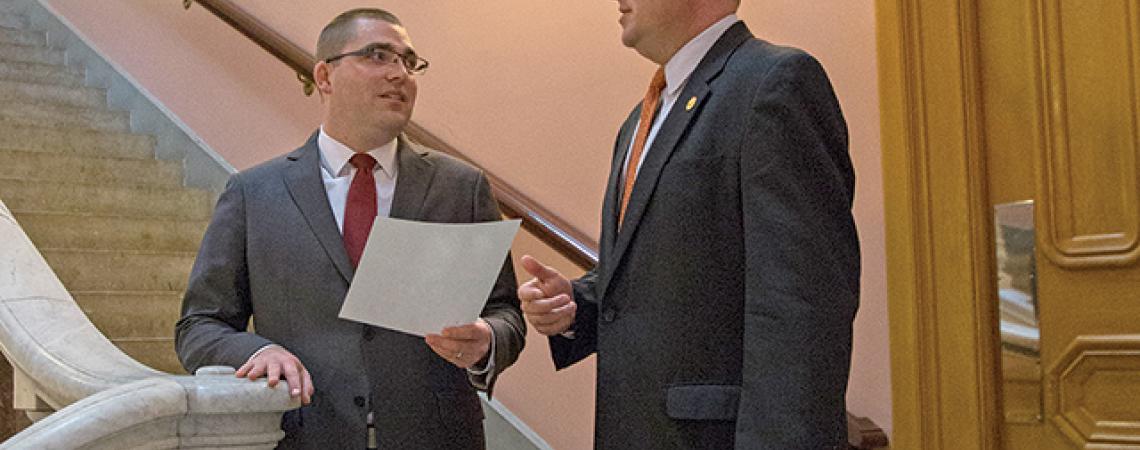Spencer Waugh and Marc Armstrong coordinate government affairs for Ohio’s Electric Cooperatives.
Keeping Ohio’s elected officials up-to-date on the concerns of electric co-op members is a year-round job for Marc Armstrong and Spencer Waugh. As director and manager, respectively, of the government affairs department of Ohio’s Electric Cooperatives, they’re at the center of today’s biggest issues. They play a vital role in helping elected officials and regulators understand the impacts of proposed legislation and regulations on families and businesses in all parts of the state.
Whether chatting on the phone or speaking face-to-face with legislators and their staff members in the hallways and hearing rooms of government buildings in downtown Columbus or Washington, D.C., they have one goal in mind — keeping your concerns about reliable and affordable electricity service front and center in the conversation.
The co-op difference
“We spend a lot of our time talking about what electric cooperatives do,” Waugh says. “We explain how we’re different from investor-owned utilities and how our business model works.” Waugh notes that many elected officials in Columbus and Washington come from more urban and industrialized parts of Ohio, with little personal experience with or knowledge of electric cooperatives.
Armstrong says he and Waugh often have to begin with the basics. Every two years, newly elected representatives replace others who’ve left office due to term limits. As those new legislators converge in Columbus, Waugh and Armstrong must educate them on the cooperative model, explaining that although electric co-operatives are not subject to Public Utilities Commission of Ohio (PUCO) jurisdiction in terms of rates, the co-ops still must follow sound business practices and careful accounting rules.
“A lot of our work is educational,” Armstrong says. “We spend a lot of time explaining how the cooperative business model fits into the energy world. We talk about how we are member-owned and member-regulated, and how our not-for-profit business structure serves our members very well.”
Waugh notes that each time a new legislative issue comes up, he and Armstrong work tirelessly to advise officials how various courses of action would affect co-op members. Very often, the facts they provide result in changes.
“What we do is develop relationships with elected officials,” Waugh says. “The fact that we’re often successful in our legislative efforts is due to the way we go about our work. We make it possible for officials to visit individual co-ops and meet with our CEOs at frequent intervals. Marc and I represent all 24 distribution co-ops and our generation and transmission co-op. Working together with the members, we are more successful than any of us could be just on our own.”
Deciding Ohio’s energy future
Armstrong and Waugh face a different challenge when they go to Washington to explain the concerns of Ohio’s electric co-op members to members of Congress. “Our challenge and our goal is to bring our message to lawmakers and decision makers in Washington,” Armstrong says. “We try to be an advocate for people who may not feel that their interests are being accounted for.”
In early May, Armstrong and Waugh, along with staff members from the statewide association and eight distribution co-op CEOs, visited Washington to meet with lawmakers to discuss the latest legislative issues. Armstrong says, “The positions we take on issues are based on ensuring that we have the most affordable rates for our members, while also assuring the electricity we provide is reliable and environmentally responsible.”
Armstrong and Waugh have taken an active role in Ohio’s opposition to the U.S. Environmental Protection Agency’s Clean Power Plan announced last fall. “We have been very aggressive with federal lawmakers, explaining the devastating effects that the Clean Power Plan will have on Ohio if it is implemented,” Armstrong says. “We are part of the lawsuit challenging the legality of the plan. We think it will have a very damaging impact on our members’ rates. The EPA’s plan will also cause job losses in many of our communities.”
In February, the U.S. Supreme Court issued a “stay” for the Clean Power Plan, hitting the pause button until the arguments in the many lawsuits can be heard. But Armstrong and Waugh continue to monitor the situation, which may not be resolved for several years.
In the meantime, during this presidential election year with many seats up for grabs in Ohio’s legislature and Congress, Armstrong and Waugh have another important duty. “We’re reaching out to co-op members to help educate them about our issues and where the candidates stand,” Waugh says.
Nancy Grant is a member of the Cooperative Communicators Association.









